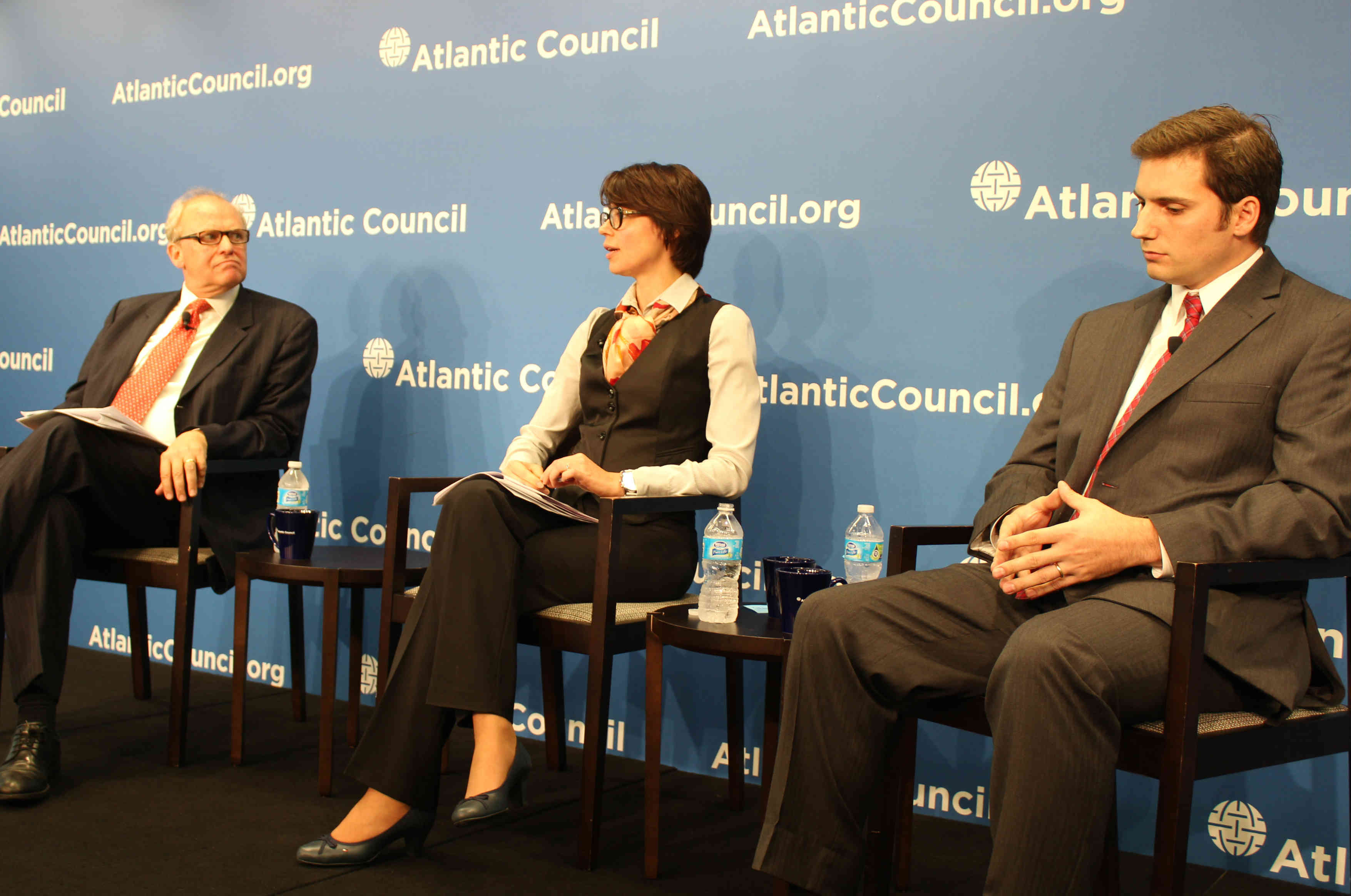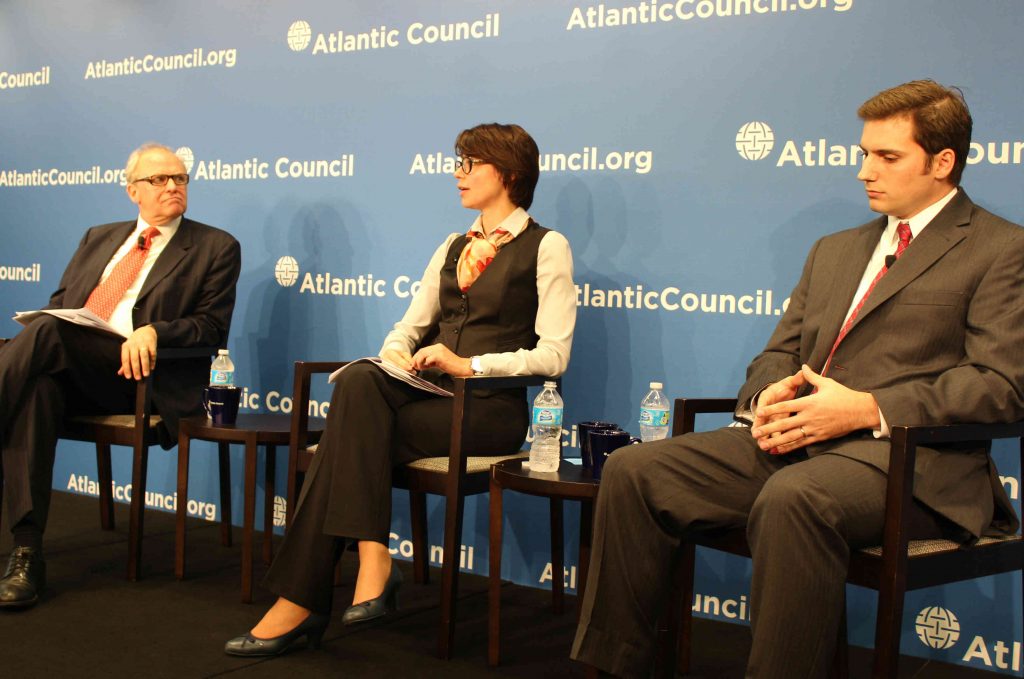 If the Ukrainian government does not follow through with an ambitious reform agenda, public support will wane while dissatisfaction will increase, threatening political stability and the country’s future. “There is no time for slow evolutionary changes. Radical and revolutionary reforms are the only way to success,” warns a new report issued September 28.
If the Ukrainian government does not follow through with an ambitious reform agenda, public support will wane while dissatisfaction will increase, threatening political stability and the country’s future. “There is no time for slow evolutionary changes. Radical and revolutionary reforms are the only way to success,” warns a new report issued September 28.
“After years of mismanagement, nearly every aspect of economic and political life in Ukraine needs reform,” said Olena Bilan, a co-author of the report, “Ukraine: From Evolutionary to Revolutionary Reforms.”
Bilan, a Chief Economist at Ukraine’s leading investment bank Dragon Capital and an editor at VoxUkraine, and her co-author Mike Duane, a contributor to VoxUkraine, discussed their 10-page report at a September 28 conference hosted by the Atlantic Council in Washington.
Other authors of the report include Yuriy Gorodnichenko, an Associate Professor in the Department of Economics at the University of California, Berkley, and a co-founder of VoxUkraine, and Ilona Sologoub, a Research Associate at the Kyiv Economics Institute and the Managing Editor of VoxUkraine.
The report is a publication of VoxUkraine, an analytical platform led by a group of top economists, lawyers, and members of the Ukrainian policy community, who monitor the reform process.
Ukrainian leaders pledged to push through a long list of reforms after the Euromaidan protests, which led to the revolution in 2014.
To identify where to start, VoxUkraine polled experts who identified five areas as the most urgent—corruption, the energy sector, excessive regulation, civil service bureaucracy, and a mismanaged financial sector.
“The key question is not whether the country must implement reform, but where the current administration should start the process and devote most of its time and resources,” Bilan said.
“Are there any reforms taking place in Ukraine? The answer is yes,” she said.
However, these reforms are “moving quite slowly,” she added.
VoxUkraine assesses the speed and quality of reforms, scoring progress from -5 to +5. Since early 2015, the score rarely rose above +2—which experts consider an “acceptable pace of reforms” —and when it did, it was largely a result of parliament passing legislation that was required by the International Monetary Fund.
VoxUkraine experts identified three major reforms undertaken by Ukraine’s parliament: an increase of the domestic gas tariff by 285 percent, an approval of legislation that cleaned up the banking system, and the adoption of a gas market law that is in line with European practices.
Other prominent reform achievements include the establishment of the National Anti-Corruption Bureau, the introduction of a new police force, increased transparency in public procurement, and a law to deregulate the business environment.
Following their presentations, Bilan and Duane joined a panel with Anders Åslund, a Senior Fellow at the Atlantic Council’s Dinu Patriciu Eurasia Center.
“The reforms that have been undertaken have been very substantial,” Åslund said.
Ukraine set up a new anti-corruption body with three legs: the National Anti-corruption Bureau, a specialized anti-corruption prosecutor, and the National Agency for the Prevention of Corruption.
The face of reform effort is the new bureau, which is the first of its kind in Ukraine with civilian oversight. However, the anti-corruption prosecutor doesn’t have a Director or staff, nor does the National Agency for the Prevention of Corruption.
The Kyiv police inaugurated 2,000 new patrol officers July 4, and new forces began working in Kharkiv, Lviv, and Odesa as well. Similar measures are planned in war-torn Kramatorsk and Slovyansk.
But Kyiv’s 2,000 new officers are up against 150,000 people who report to the Ministry of Interior, Åslund pointed out.
Still others say that the new forces are an important symbol, especially when the bulk of the reforms have been incremental and complex.
“I think it’s extremely important right now to have symbols of success. Something that ordinary people can see and feel. One successful reform,” Duane said.
What is to be done?
“We have to clean up the Prosecutor General’s office and the courts. Otherwise all these other efforts… don’t work,” Åslund said.
“Nothing is really functioning” when it comes to the new anti-corruption bodies, he added.
Åslund called Ukraine’s 18,000 prosecutors “the real force of corruption” in the country.
“If you don’t get control over the Prosecutor General, you can’t do anything,” he said.
“The other problem is 10,000 judges,” he added.
He urged the Ukrainian government to follow the radical path of some post-Soviet countries and sack the Prosecutor General and all judges.
Judicial reform would be the “most challenging task” for Ukraine, said Bilan.
To clean up the judiciary, she urged a dual-track approach similar to the one undertaken with the police force, “creating a new system little by little” and “the old system will gradually disappear.”
But Åslund rejected the idea. “Evolution doesn’t work,” he said.
In 2014, parliament passed a law on lustration that the President signed, but only 800 people have been removed so far. Åslund called the figure “far too few.”
“There is little political will inside the influential elite and there’s little stomach for corruption reforms,” Duane said. “Until that changes, the spread of these anti-corruption reforms is going to be slow and the scope of the reforms will continue to be narrow.”
The mood in Ukraine
More than 80 percent of Ukrainians say that reforms haven’t gotten off the ground.
“There is progress and there are good reforms to point to… but reform efforts continue to be derailed by these entrenched political interests,” Duane said.
Åslund said Ukrainian business owners had told him that there’s as much corruption as before the Euromaidan, but it’s more disorganized now and they don’t know whom to bribe.
“This is a country with great people and great economic potential that has never materialized,” Bilan lamented.
Guardedly optimistic
“If the Prosecutor General is sacked within two months, then we have reason to be optimistic,” Åslund predicted. “If not, that’s a serious problem.”
The Prosecutor General, Viktor Shokhin, is Ukraine’s third Prosecutor General in the past eighteen months.
“There’s no option but to succeed,” Duane said.
“The failure of Ukraine would mean the success of Russia,” Bilan noted.
Melinda Haring is the editor of the UkraineAlert at the Atlantic Council.
Image: Anders Åslund, a Senior Fellow at the Atlantic Council’s Dinu Patriciu Eurasia Center, Olena Bilan, a Chief Economist at Ukraine’s leading investment bank Dragon Capital and an editor at VoxUkraine, and Mike Duane, a contributor to VoxUkraine, analyze the speed and depth of Ukraine’s reforms on September 28.
